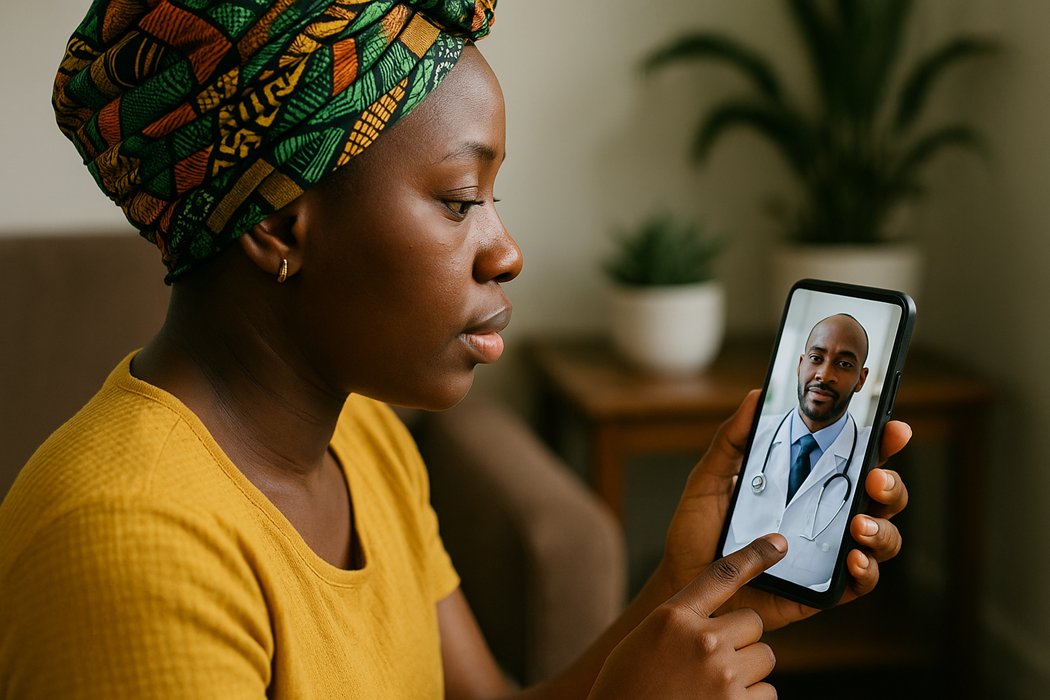Health
Telemedicine: The Tech You’re Ignoring That Could Save Your Life
From Lagos to Kano, telemedicine is quietly changing healthcare access in Nigeria. Learn how online doctors, health apps, and AI diagnostics are saving lives.

- From Lagos to Kano, telemedicine is quietly changing healthcare access in Nigeria. Learn how online doctors, health apps, and AI diagnostics are saving lives — often for less than the price of fuel.
A Visit to the Doctor — Without Leaving Home
Imagine waking up with a severe fever, the nearest hospital is miles away, and traffic is already building. In the old days, you’d have no choice but to queue endlessly at a clinic. Today, all it takes is a smartphone and data connection.
Welcome to telemedicine — the quiet revolution transforming healthcare in Nigeria.
In a country where doctor-to-patient ratios are among the worst globally (one doctor to over 5,000 patients, according to the World Health Organization), digital healthcare platforms are bridging the gap that hospitals alone can’t.
What Exactly Is Telemedicine?
Simply put, telemedicine means getting medical advice or treatment remotely — via phone, chat, or video. It allows patients to connect with licensed doctors without physical visits.
Platforms like Dokita247, CribMD, and Wellvis Health are making this possible right from your living room.
Through these apps, you can:
- Consult a doctor 24/7.
- Get prescriptions delivered to your door.
- Receive lab test recommendations or mental health counseling.
And most importantly — it’s affordable.

Why Nigerians Are Turning to Telemedicine
- Accessibility: Many rural communities don’t have hospitals, but they do have phones. With telemedicine, distance is no longer a barrier.
- Affordability: A 15-minute call with a licensed doctor can cost less than ₦2,000 — compared to the ₦10,000 hospital visit that might include “card fees” and waiting hours.
- Privacy: People seeking help for sensitive issues like STDs or mental health can talk without fear of stigma.
- Speed: No queues, no traffic, no excuses.
A BusinessDay HealthTech report shows that telemedicine use in Nigeria jumped by over 200% since 2020, driven by lockdowns, smartphone growth, and youth awareness.
The COVID-19 Effect
The 2020 pandemic forced Nigerians to rethink healthcare. When clinics were overloaded, people turned to WhatsApp doctors, online pharmacies, and virtual checkups.
That crisis created a permanent shift — people realized that healthcare can be digital.
Even after restrictions ended, many Nigerians stuck with telemedicine because it was simply easier and safer.
Apps like CribMD reported thousands of new sign-ups weekly during the pandemic, and that momentum has continued.
AI and the Future of Health Tech
The next big wave is Artificial Intelligence (AI) in healthcare.
Some Nigerian startups are already integrating AI tools that help:
- Detect early signs of diseases from uploaded symptoms.
- Scan X-rays or skin photos for potential conditions.
- Recommend treatment plans faster than traditional hospital systems.
A Forbes Africa article highlighted how AI-driven diagnostics are reducing human errors in early detection of diabetes, hypertension, and cervical cancer.
Soon, your phone could alert you about a potential health issue before your body even feels it.
Challenges Slowing Down Telemedicine in Nigeria
Of course, no revolution comes without friction. Telemedicine still faces big challenges:
- Internet cost and coverage: In many rural areas, poor network makes video consultations difficult.
- Trust issues: Some Nigerians still don’t trust “online doctors” or fear scams.
- Regulation: The Medical and Dental Council of Nigeria (MDCN) is still defining clear laws for digital practice.
- Digital illiteracy: Many older Nigerians don’t know how to use apps or navigate online forms.
Despite this, adoption continues to grow — because convenience always wins.
Who’s Leading the Change?
A few key players are shaping Nigeria’s telemedicine landscape:
- CribMD: Offers home doctor visits and video consultations nationwide.
- Wellvis Health: Provides personalized digital health advice and connects patients to verified professionals.
- Dokita247: Focuses on 24-hour medical advice and follow-up consultations.
- Healthtracka: Delivers lab test results to your phone within hours.
- MDaaS Global: Uses cloud-connected diagnostic equipment to improve clinic efficiency.
These platforms aren’t just apps — they’re lifelines.
Telemedicine and Mental Health: The Unspoken Lifeline
One of the most underrated benefits of telemedicine in Nigeria is how it’s helping people with mental health issues.
DON’T MISS: If You Sleep Less Than 6 Hours, Read This Before It’s Too Late
Before now, therapy was considered a luxury or taboo. But now, through apps like MyTherapist Nigeria, people can talk to licensed psychologists online — anonymously and affordably.
This has especially helped young Nigerians battling depression, anxiety, or burnout. The digital bridge has given mental wellness a new chance to be taken seriously.
Government and Private Sector Partnership
To make telemedicine sustainable, Nigeria needs better collaboration between government, telecoms, and tech startups.
Imagine if MTN or Airtel offered discounted data plans for health consultations, or if the Federal Ministry of Health integrated verified telemedicine platforms into public hospitals.
Countries like India and Kenya already have national telehealth programs — Nigeria could follow that model to reach more citizens.

The Real Impact: Lives Saved Silently
Telemedicine has already saved countless Nigerians — from diabetics who now get regular checkups, to mothers who receive safe prenatal care in remote villages.
One touching story is that of Amara, a young mother in Enugu who used her phone to contact a doctor after her child developed severe fever at night. The virtual doctor guided her through emergency steps that stabilized the child before morning.
That one call — through technology — made the difference between panic and peace.
Conclusion: The Doctor Is in Your Pocket
Healthcare is changing faster than ever, and the smartest Nigerians are already embracing it.
You don’t need to wait until sickness becomes an emergency. Your phone can now connect you to help faster than an ambulance can reach you.
Telemedicine isn’t just convenient — it’s life-saving. And ignoring it could be one of the most expensive mistakes you make.
So the next time you fall sick, don’t rush to self-medicate.
Open your phone. Your doctor might already be online.






















